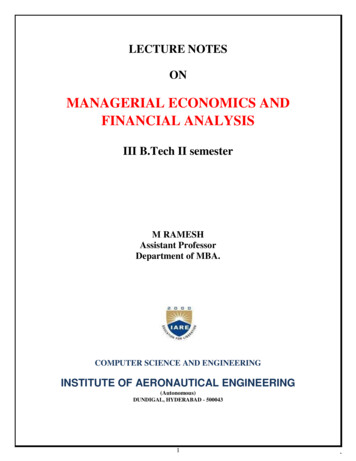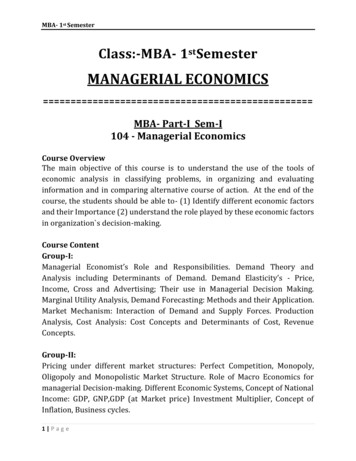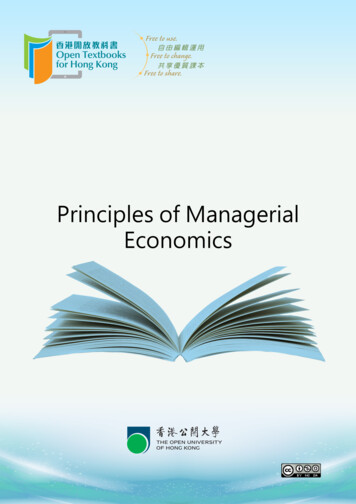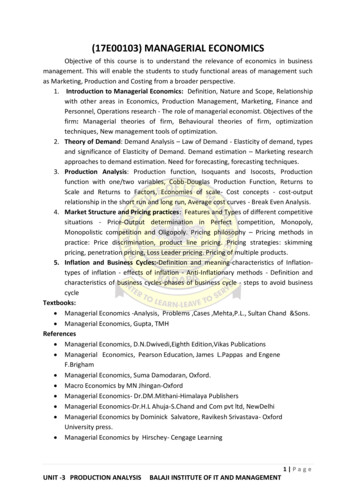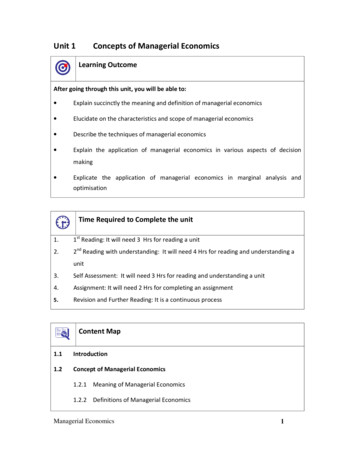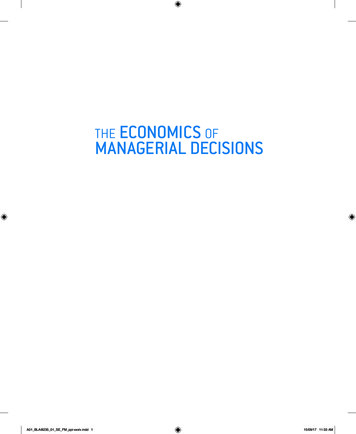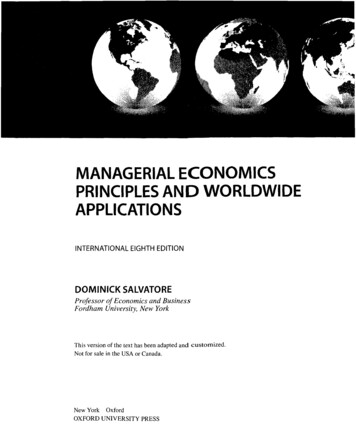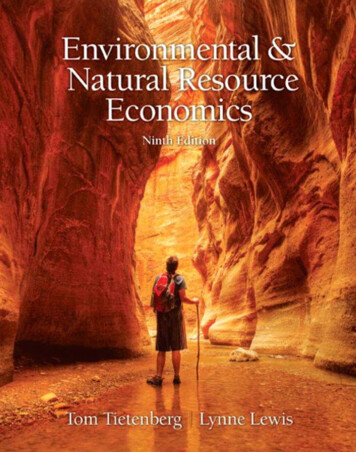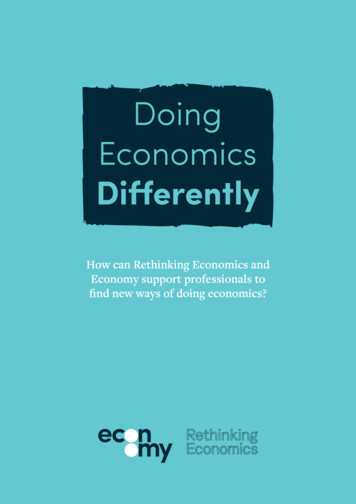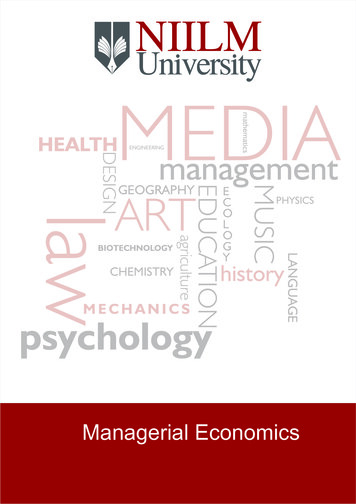
Transcription
entHEALTHManagerial Economics
Subject: MANAGERIAL ECONOMICSCredits: 4SYLLABUSBasics of Managerial EconomicsIntroduction to Economics, Basics of Managerial Economics, Introduction to Economics, Nature and Scope ofManagerial Economics, Managerial Economics & Economics Related Disciplines Interrelationship with OtherSubjects, Economics ToolsDemand TheoryDemand Analysis, Elasticity Concepts, Demand Forecasting, and Importance of Demand forecastingCost of Production:Cost Analysis, Economic of Scale, Cost Reduction and Cost control, Capital BudgetingProduction TheoryIntroduction to Production Concept, Production Analysis, Stage of Production, Return to Scale, SupplyAnalysisMarket AnalysisIntroduction to market Structure, Perfect Competition, Monopoly, Oligopoly and PricingSuggested Readings:1. Managerial Economics – Analysis, Problems and Cases, P.L. Mehta, Sultan Chand Sons, New Delhi2. Managerial Economics – Varshney and Maheshwari, Sultan Chand and Sons, New Delhi3. Managerial Economics – D. Salvatore, McGraw Hill, New Delhi4. Managerial Economics – Pearson and Lewis, Prentice Hall, New Delhi5. Managerial Economics – G.S. Gupta, T M H, New Delhi
--------NATURE AND SCOPE OF ECONOMIC ----------------Structure1.1 Introduction to Economics1.2 Concept of Economics in Decision Making1.3 Scope of Managerial Economics1.4 Relationship between Managerial Economics and Other Subjects1.5Tools and Techniques of Decision Making1.6 Review -----------------1.1 INTRODUCTION TO ----------------This unit introduces you to the basic concepts of Economics. After going through thisunit you will come to know how Economics is helpful for Managers in their Decisionmaking process.Objectives: To analyze the concept of economics- scarcity and efficiency Micro Economics and macro economics Concept of managerial economics How managerial economics differ from economics and its relationship withmanagementGood morning students, the basic purpose of our studying of economics are the efficientutilization of scarce resources. We always have to make choices amongst variousalternatives available for efficient utilization of our scarce resources. The twin theme ofeconomics is scarcity and efficiency. We will discuss this twin theme in detail beforecoming to managerial economics.Scarcity and Efficiency: The first question which comes here is what is Economics?Economics is the study of how society chooses to use productive resources that havealternative uses, to produce commodities of various kinds, and to distribute them amongdifferent groups.Two key ideas in economics: Scarcity of goods5
Efficient use of resources Scarcity of goodsThe word scarce is closely associated with the word limited or economic as opposed tounlimited or free. Scarcity is the central problem of every society. Concept lies at the problem of resource allocation and problem of a businessenterprise. The essence of any economic problem, micro or macro, is the scarcity ofresources. The managers who decide on behalf of the corporate unit or the national economyalways face the economic problem of Scarcity of good quality of materials orskilled techniciansAs a Marketing Manager: He may be encountering scarcity of sales force at hiscommandAs a Finance Manager: He may be facing the scarcity of funds necessary for expansionor renovate a programAs a Finance Minister of the Country: His basic problem when he prepares the budgetevery year is to find out enough revenue resources to finance the necessary expenditureon plans and programs. Thus, we see that Scarcity is a universal phenomenon.Let us attempt a technical definition of “Scarcity” In economic terms it can be termed as “ Excess of Demand” Any time for any thing if its demand exceeds its supply, that thing is said to bescarce. Scarcity is a relative term: Demand in relation to its supply determines theelement of scarcity.Problem:Unemployment: Scarcity of jobsUnsold stock of inventory: Scarcity of buyersUnder utilized capacity of plan: Scarcity of power or other support facilities.Had there been no scarcities there would not have been any managerial problem. It isonly because of this scarcity a manager has to decide on optimum allocation of scarceresources of: Man Materials Money Time EnergyThus we see that every business unit or manager must aim at rational but optimumallocation of scarce resources. Optimality lies in finding the best use of scarce resources,given to the constraints.6
Efficiency of ResourcesEconomy makes best use of its limited resources. That brings the critical notion ofefficiency. Efficiency denotes most effective use of a society’s resources in satisfyingpeople’s wants and needs.Consider the Monopoly Situation: In economics we say that an economy is producingefficiently when it cannot make anyone economically better off without making someoneelse worse off. The essence of economics is to acknowledge the reality of scarcity andthen figure out how to organize society in such a way, which produces the most efficientuse of resources. Economics can be called as social science dealing with economicsproblem and man’s economic behavior. It deals with economic behavior of man insociety in respect of consumption, production; distribution etc. Economics can be calledas an unending science. There are almost as many definitions of economy as there areeconomists. We know that definition of subject is to be expected but at this stage it ismore useful to set out few examples of the sort of issues which concerns professionaleconomists.Example: For e.g. most of us want to lead an exciting life i.e. life full of excitements,adventures etc. but unluckily we do not always have the resources necessary to doeverything we want to do. Therefore choices have to be made or in the words ofeconomists “individuals have to decide “how to allocate scarce resources in the mosteffective ways”. For this a body of economic principles and concepts has been developedto explain how people and also business react in this situation. Economics provideoptimum utilization of scarce resources to achieve the desired result. It provides the basisfor decision making. Economics can be studied under two heads:1. Micro Economics2. Macro EconomicsMicro Economics: It has been defined as that branch where the unit of study is anindividual, firm or household. It studies how individual make their choices about what toproduce, how to produce, and for whom to produce, and what price to charge. It is alsoknown as the price theory and is the main source of concepts and analytical tools formanagerial decision making. Various micro-economic concepts such as demand, supply,elasticity of demand and supply, marginal cost, various market forms, etc. are of greatsignificance to managerial economics.Macro Economics: It’s not only individuals and forms that are faced with having tomake choices. Governments face many such problems. For e.g. How much to spend onhealth; How much to spend on services; How much should go in to providing socialsecurity benefits. This is the same type of problem faced by all of us in our daily lives butin different scales. It studies the economics as a whole. It is aggregative in character andtakes the entire economy as a unit of study. Macro economics helps in the area offorecasting. It includes National Income, aggregate consumption, investments,employment etc.7
Following are the various economic concepts which are useful for managers for decisionmaking: Price elasticity of demand Income elasticity of demand Cost and output relationship Opportunity cost Multiplier Propensity to consume Marginal revenue product Production function Demand theory Theory of firm: price, output and investment decisions Money and banking Public finance and fiscal and monetary policy National income Theory of international tradeThe Three Problems of Economic Organization: Because of scarcity, all economicchoices can be summarized in big questions about the goods and services a society shouldproduce. These questions are: What to produce? How to produce? For whom to produce?What to Produce?The first question every society faces is what to produce. Should a society build moreroads or schools? Because of scarcity, society can not build everything it wants. Choiceshave to be made. Once a society determines what to produce it then needs to decide howmuch should be produced. In a market economy the "what" question is answered in largepart by the demand of consumers?How to Produce?The next question a society needs to decide after what to produce is how to produce thedesired goods and services. Each society must combine available technology with scarceresources to produce desired goods and services. The education and skill levels of thecitizens of a society will determine what methods can be used to produce goods andservices. For example, does a nation possess the technology and skills to pick grapes witha mechanized harvester, or does it have to pick the grapes by hand?For whom to produce?The final question each society needs to ask is for whom to produce. Who is to receiveand consume the goods and services produced? Some workers have higher incomes thanothers. This means more goods and services in a society will be consumed by thesewealthy individuals, and less by the poor. Different groups will benefit from the differentways that we choose to spend our money.8
Inputs and Outputs: Every economy must make choices about the economy’s inputsand outputs.Inputs: Commodities used to produce goods and services .A economy uses its existingtechnology to combine inputs to produce outputs.Output: The various useful goods and services that result from production process that isdirectly consumed or employs in further production.Another term for inputs is factors of production:Factors of Production: It refers to the resources used to produce goods and services in asociety. Economists divide these resources into the four categories described below. Land refers to all natural resources. Such things as the physical land itself, water,soil, timber are all examples of land. The economic return on land is called rent.For example, a person could own land and rent it to a farmer who could use it togrow crops. A second resource is labor. Labor refers to the human effort to produce goods and services. The economicreturn on labor is called wages. Anyone who has worked for a business andcollected a paycheck for the work done understands wages. A third factor ofproduction is capital. Capital is anything that is produced in order to increase productivity in the future.Tools, machines and factories can be used to produce other goods. The field ofeconomics differs from the field of finance and does not consider money to becapital. The economic return on capital is called interest. Finally, the fourth factor of production is called entrepreneurship.Entrepreneurship refers to the management skills, or the personal initiative usedto combine resources in productive ways. Entrepreneurship involves the taking ofrisks. The economic return on entrepreneurship is profitsMeaning of Managerial Economics: It is another branch in the science of economics.Sometimes it is interchangeably used with business economics. Managerial economics isconcerned with decision making at the level of firm. It has been described as aneconomics applied to decision making. It is viewed as a special branch of economicsbridging the gap between pure economic theory and managerial practices. It is defined asapplication of economic theory and methodology to decision making process by themanagement of the business firms. In it, economic theories and concepts are used to solvepractical business problem. It lies on the borderline of economic and management. Ithelps in decision making under uncertainty and improves effectiveness of theorganization. The basic purpose of managerial economic is to show how economicanalysis can be used in formulating business plans.Definitions of Managerial Economics: In the words of Mc Nair and Merriam,” MEconsist of use of economic modes of thought to analyze business situation”. According toSpencer and Seigelman it is defined as the integration of economic theory with businesspractice for the purpose of facilitating decision making and forward planning by themanagement”. Economic provides optimum utilization of scarce resource to achieve the9
desired result. ME’s purpose is to show how economic analysis can be used formulatingbusiness planning.Managerial Economics Management EconomicsManagement deals with principles which helps in decision making under uncertainty andimproves effectiveness of the organization. On the other hand economics provide a set ofpreposition for optimum allocation of scarce resources to achieve a desired result.Managerial Economics deals with the integration of economic theory with businesspractices for the purpose of facilitating decision making and forward planning bymanagement. In other words it is concerned with using of logic of economics,mathematics, and statistics to provide effective ways of thinking about business ----------------1.2 CONCEPT OF ECONOMICS IN DECISION -------------Students, earlier we had discussed various aspects of economics- scarcity and efficiencyand meaning and role of managerial economics. Now we will be discussing the variousaspects of decision making.What do you mean by Decision Making?Well decision making is not something which is related to managers only or which isrelated to corporate world, but it is something which is related to everybody’s life.Whether a person is working or non working, irrespective of his/her field, decisionmaking is important to everyone. You need to make decision irrespective of the work youare doing. As a student also you have to take so many decisions. Suppose at a particularpoint of time you want to go for a movie, and at the same point of you want to go forshopping then what you will do. You can’t do two things at the same point of time. Youhave to decide what to do first and what to do next. Therefore decision making can becalled as choosing the right option from the given one. To decide is to choose. Whether todo this or to do that is what is decision making.Decision making is the most important function of business managers. Decision makingis the central objective of Managerial Economics. Decision making may be defined as theprocess of selecting the suitable action from among several alternative courses of action.The problem of decision making arises whenever a number of alternatives are available.Such as: What should be the price of the product? What should be the size of the plant to be installed? How many workers should be employed? What kind of training should be imparted to them? What is the optimal level of inventories of finished products, raw material, spareparts, etc.?Therefore we can say that the problem of decision making arises due to the scarcity ofresources. We have unlimited wants and the means to satisfy those wants are limited,with the satisfaction of one want, another arises, and here arises the problem of decision10
making. While performing his function manager has to take a lot of decisions inconformity with the goal of the firm. Most of the decisions are taken under the conditionof uncertainty, and involves risks. The main reasons behind uncertainty and risks areuncertain behavior of the market forces which are as follows: The demand and supply Changing business environment Government policies External influence on the domestic market Social and political changes The maximum use of limited resources.Now we will discuss various aspects relating to the management decision making orManagerial Decision Making. What Is Management?9 Management is the process of coordinating people and other resources toachieve the goals of the organization9 .Most organizations use various kinds of resources. Basic Management FunctionsA number of management functions must be performed if any organization is tosucceed.9 Establishing Goals and Objectives.9 Establishing Plans to Accomplish Goals and Objectives.9 Organizing the Enterprise. Leading and Motivating9 Controlling Ongoing Activities. Kinds of ManagersThey can be classified along two dimensions:9 Level within the organization which include: Top managers; MiddleManagers; First Line Managers.9 Area of management which include: Financial Managers; OperationsManagers; Marketing Managers; Human Resources Managers;Administrative Managers. What Makes Effective Managers?Key Management Skills. The skills that typify effective managers tend to fall intothree categories.9 Technical Skills9 Conceptual Skills.9 Interpersonal Skills.9 Managerial Roles.9 Decisional Roles9 Interpersonal Roles9 Informational Roles.11
Managerial Decision MakingDecision-making is the act of choosing one alternative from among a set ofalternatives. Managerial decision making involves four steps.9 Identifying the Problem or Opportunity9 Generating Alternatives.9 Selecting an Alternative9 Implementing and Evaluating the SolutionNow we will discuss the various factors affecting decision making. Conditions Affecting Decision Making: An Ideal Business situation would bethe one where9 Full Information with managers to make decisions with certainty9 An Actual business situation with managers:9 Most business are characterized by incomplete or ambiguous information Conditions that affect decision making: (certainty, risk and uncertainty)9 Certainty: Situation when decision makers are fully informed about Aproblem; Alternative solutions; their respective outcomes; Individuals cananticipate, and even exercise some control over events and their outcomes.9 Risk: Condition when decision makers rely on incomplete, yet reliableinformation. Manager does not know the certainty the future outcomesassociated with alternative courses of action, although he knows theprobability associated with each alternative9 Uncertainty: It is the condition that exists when little or no factualinformation is available about a problem, its alternative and their respectiveoutcomes. He does not have enough information to determine the probabilitiesassociated with each alternative possible that he may be unable even to definethe problemHope you all must be clear with the concepts certainty, risk and uncertainty. Now, wewill discuss various models of decision making. Decision Making Models The Classical Model:9 Also called rational model9 A prescriptive approach that outlines how managers should make decisions.9 Assumptions: Manager has complete information about decision situation andoperations under condition of certainty; Problem is clearly defined, and thedecision – maker has knowledge of all possible alternatives and theiroutcomes; Through the use of quantitative techniques , rationality and logic ,12
the decision maker evaluates the alternatives and selects the optimumalternative .The Administrative Model9 Descriptive approach that outlines how managers actually do makedecisions9 Also called organizational, neoclassical or behavioral model9 Simon recognized that people do not always make decisions with logicand rationality , he introduced two concepts- bounded rationality andsatisfying Bounded rationality: Means people have limits, orboundaries , to their rationality boundaries exist because people arebound by their own values and skills, incomplete information, owninability due to time , resource and rational decisions lack of time toprocess complete information about complex decisions , wind uphaving to make decisions with only partial knowledge aboutalternative solutions and their outcomes. This leads manager often forgo the various steps of decision making in favor of a quicker yetsatisfying, process satisfying9 Assumptions: Manager has incomplete information and operate undercondition of risk or uncertainty; Problem not clearly defined, managerhas limited knowledge of possible alternatives and their outcomes;Satisfies by choosing the first satisfactory alternative – one that willresolve the problem situation by offering a good solution to theproblemManagerial economics is concerned with decision making at the firm level. Decisionmaking problems faced by business firms: To identify the alternative courses of action of achieving given objectives. To select the course of action that achieves the objectives in the economicallymost efficient way. To implement the selected course of action in a right way to achieve the businessobjectives.The prime function of management is Decision making and forward planning. Forwardplanning goes hand in hand with decision making. Forward planning means establishingplans for the ---------------1.3 SCOPE OF MANAGERIAL ----------------Can you tell me what you mean by the scope of the managerial economics? Well scope issomething which tells us how far a particular subject will go. As far as ManagerialEconomic is concerned it is very wide in scope. It takes into account almost all theproblems and areas of manager and the firm. Managerial economics deals with Demandanalysis, Forecasting, Production function, Cost analysis, Inventory Management,Advertising, Pricing System, Resource allocation etc. Following aspects are to be takeninto account while knowing the scope of managerial economics:13
Demand Analysis and Forecasting: Unless and until knowing the demand for aproduct how can we think of producing that product. Therefore demand analysisis something which is necessary for the production function to happen. Demandanalysis helps in analyzing the various types of demand which enables themanager to arrive at reasonable estimates of demand for product of his company.Managers not only assess the current demand but he has to take into account thefuture demand also.Production Function: Conversion of inputs into outputs is known as productionfunction. With limited resources we have to make the alternative use of thislimited resource. Factor of production called as inputs is combined in a particularway to get the maximum output. When the price of input rises the firm is forcedto work out a combination of inputs to ensure the least cost combination.Cost analysis: Cost analysis is helpful in understanding the cost of a particularproduct. It takes into account all the costs incurred while producing a particularproduct. Under cost analysis we will take into account determinants of costs,method of estimating costs, the relationship between cost and output, the forecastof the cost, profit, these terms are very vital to any firm or business.Inventory Management: What do you mean by the term inventory? Well theactual meaning of the term inventory is stock. It refers to stock of raw materialswhich a firm keeps. Now here the question arises how much of the inventory isideal stock. Both the high inventory and low inventory is not good for the firm.Managerial economics will use such methods as ABC Analysis, simple simulationexercises, and some mathematical models, to minimize inventory cost. It alsohelps in inventory controlling.Advertising: Advertising is a promotional activity. In advertising while the copy,illustrations, etc., are the responsibility of those who get it ready for the press, theproblem of cost, the methods of determining the total advertisement costs andbudget, the measuring of the economic effects of advertising are the problems ofthe manager. There’s a vast difference between producing a product andmarketing it. It is through advertising only that the message about the productshould reach the consumer before he thinks to buy it. Advertising forms theintegral part of decision making and forward planning.Pricing system: Here pricing refers to the pricing of a product. As you all knowthat pricing system as a concept was developed by economics and it is widelyused in managerial economics. Pricing is also one of the central functions of anenterprise. While pricing commodity the cost of production has to be taken intoaccount, but a complete knowledge of the price system is quite essential todetermine the price. It is also important to understand how product has to bepriced under different kinds of competition, for different markets. Pricing equalscost plus pricing and the policies of the enterprise. Now it is clear that the pricesystem touches the several aspects of managerial economics and helps managersto take valid and profitable decisions.Resource allocation: Resources are allocated according to the needs only toachieve the level of optimization. As we all know that we have scarce resources,and unlimited needs. We have to make the alternate use of the available resources.14
For the allocation of the resources various advanced tools such as linearprogramming are used to arrive at the best course of action.Nature of Managerial Economics: Managerial economics aims at providing help indecision making by firms. It is heavily dependent on microeconomic theory. The variousconcepts of micro economics used frequently in managerial economics includeElasticity of demand; Marginal cost; Marginal revenue and Market structures and theirsignificance in pricing policies. Macro economy is used to identify the level of demand atsome future point in time, based on the relationship between the level of national incomeand the demand for a particular product. It is the level of national income only that thelevel of various products depends. In managerial economics macro economics indicatesthe relationship between (a) the magnitude of investment and the level of nationalincome, (b) the level of national income and the level of employment, (c) the level ofconsumption and the level of national income. In managerial economics emphasis is laidon those prepositions which are likely to be useful to -------------------1.4 RELATIONSHIP BETWEEN MANAGERIAL ECONOMICS ANDOTHER ---------------After studying the above you will be able to distinguish managerial economics with itsrelated subjects. Managerial economic is not something which is related to economicsonly, but there are other areas also to which managerial economic is related. Other relatedsubjects of managerial economics are: Economics Mathematics Statistics Accounting Operation Research Computers ManagementBefore knowing the relationship between managerial economics and other related fields itis customary to divide economics into “positive” and “normative” economics.Economists make a distinction between positive and normative that closely parallelspopper’s line of demarcation.Positive Economics: It deals with description and explanation of economic behavior,Economics and Managerial economics. Managerial economics draws on positiveeconomics by utilizing the relevant theories as a basis for prescribing choices. A positivestatement is a statement about what is and which contains no indication of approval ordisapproval. It’s not like that positive statement is always right, positive statement can bewrong. Positive statement is a statement about what exists.Normative Economics: It is concerned with prescription or what ought to be done. Innormative economics, it is inevitable that value judgment are made as to what should and15
what should not be done. Managerial economics is a part of normative economics as itsfocus is more on prescribing choice and action and less on explaining what has happened.It expresses a judgment about whether a situation is desirable or undesirable. The primarytask of Managerial economics is to fit relevant data to this framework of logical analysisso as to reach valid conclusion as a basis for action. Another branch of economics whichis normative like managerial is public policies analysis which is concerned with theproblems of managing the government of a country.Economic and Managerial Economics: Economics contributes a great deal towards theperformance of managerial duties and responsibilities. Just as the biology contributes tothe medical profession and physics to engineering, economics contributes to themanagerial profession. All other qualifications being same, managers with workingknowledge of economics can perform their function more efficiently than those withoutit.What is the Basic Function of the Managers of the Business?As you all know that the basic function of the manager of the firm is to achieve theorganizational objectives to the maximum possible extent with the limited resourcesplaced at their disposal. Economics contributes a lot to the managerial economics.Mathematics and Managerial Economics: Mathematics in Managerial Economics hasan important role to play. Businessmen deal primarily with concepts that are essentiallyquantitative in nature e.g. demand, price, cost, wages etc. The use of mathematical
1. Managerial Economics – Analysis, Problems and Cases, P.L. Mehta, Sultan Chand Sons, New Delhi 2. Managerial Economics – Varshney and Maheshwari, Sultan Chand and Sons, New Delhi 3. Managerial Economics – D. Salvatore, McGraw Hill, New Delhi 4. Managerial Economics
